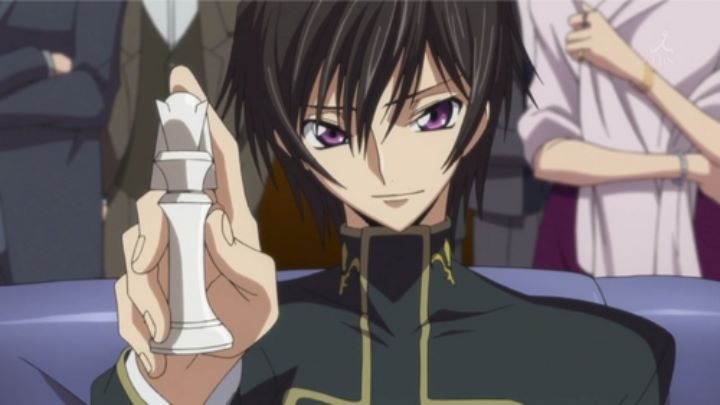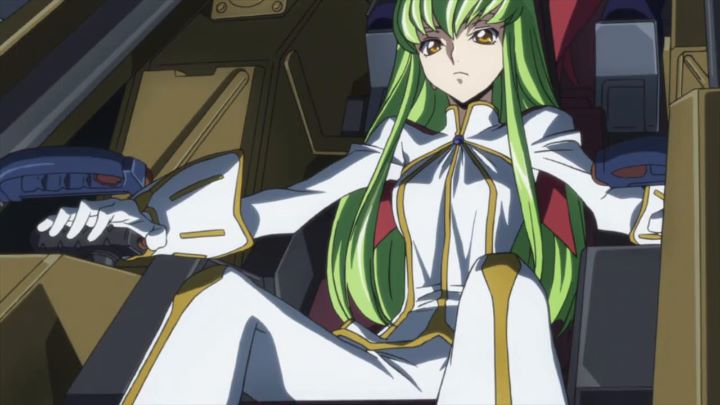










Disclaimer: this review covers 2006's "Code Geass: Lelouch of the Rebellion" and 2008's "Code Geass: Lelouch of the Rebellion R2."I'll come out and say it: I don't like "Gundam" shows. For that matter, that generally applies to all anime featuring giant flying mech robots fighting each other. They are kind of important to the medium, as their popularity and expansion to anime, toys, figures and games made robots a defining feature of anime since the 1980's. But I don't like their generic space-opera plots with hypocritical anti-war themes, where each action scene is barely animated and leans on bigger, faster robots with more powerful laser canons being developed every few episodes to define the way battles play out. Despite all that, I can wholeheartedly recommend "Code Geass - Lelouch of the Rebellion." It is a addictively enjoyable show that I am a fan. While it isn't technically related to "Gundam" in any way, it IS prepared by Sunrise, the same studio that made themselves off the success of Gundam over the last few decades. If you are a fan of Gundam, you should enjoy "Code Geass." If not, it checks off so many other boxes that it is a great portrait of the trends of anime from the period: if you simply like anime, you will probably like "Code Geass."If I had to narrow it down, I would define "Code Geass" as a mixture of Gundam (I don't care which one, pick your favorite) and "Death Note." In the first few episodes, we are introduced to a harsh alternate reality where Britannia has invaded most of the free world, including Japan, which has been reduced to simply being called "Area 11," its citizens treated like dogs, while British citizens occupy the community and live with high status, mostly carefree to the difference in class to the Japanese. Lelouch Lamperouge is one such British student in Japan, secretly with royal blood as one of several heirs to the Britannian throne, but choosing to live in exile with his blind sister Nunally. After a series of events involving local terrorists nearly has him killed by the police, Lelouch is given the power of Geass by a mysterious emerald-haired woman, a power that allows him to look directly in the eye of a victim and have them follow virtually ANY one order. Using the power to survive, he immediately sees it as his chance to overturn his father's dominion for the sake of his sister's well-being, and begins his assult as the masked vigilante known as "Zero," uniting the rebels of Japan to his cause while slowly taking out his brothers and sisters that stand in his way. To further complicate things is Suzaku Kururugi, Lelouch's childhood friend and Japanese native who rose through the ranks as a promising Britannian pilot of the mech robots known as Knightmare Frames. Lelouch's plotting and Suzaku's sense of justice come into conflict, inevitably leading to a plenty of drama throughout the war to come.Phew, that was a long paragraph. And director Goro Taniguchi's editing style can be off-putting for the first few episodes: he jumps all over the place, introducing characters that have no relevance until 30 episodes later, often cutting off conversations during sentences such as "... but I -". But after getting used to it, you'll find each episode ends with progressively more significant cliffhangers, and it's difficult to stop. It's a thrilling ride, filled with a variety of side characters on both sides of the conflict, from menacing army captains to innocent members of the student club. The show juggles its pacing from lighthearted school humor and the scary reality of using human lives to advance your goals in battle. It isn't necessarily well-written, but it is well thought out, and is arguably the most entertaining I've seen an anime be. Although some of the jarring genre choices can be offputting: you might see horrific bloodshed of a loved one, disturbing racism, sexualized fanservice of most of the teenage-aged female characters (including a masturbation scene involving a table), and a comedic chase scene involving a mischievous cat.  Why do I prefer "Code Geass" to Gundam? To start, the mechs are grounded, so the invincibilty of being able to fly with super-powered canons are not as much of an issue. And the background scheming and politics, while not unusual in Gundam, feel more engaging. Again, it feels a lot like "Death Note," which had used high-theatrics and themes of going to extremes to make a perfect world to great effect. The art direction is pretty spectacular, almost entirely because of the unique and attractive character designs provided by popular group CLAMP. They might not be to everyone's tastes: they are skinny and elongated, with pointed chins and large eyes, perfect for exagerrated poses. I personally think highly of the art and think it goes a long way to define the show. The animation makes good use of the character designs, and (unusual by this point) beautiful 2D animation for the robots and environments. The music features loud trumpets and drums, emphazising emperical marches for the fight music, and is instantly memorable and enchances the moment. And whether you enjoy Japanese or English acting, you won't be disappointed with the voices: (most of) the actors embody their characters, not the least which is that of the delgihtfully hammy performance of Lelouch himself. Briefly, I will mention the second season of "Code Geass:" after a doozy of a cliffhanger at the end of sesaon one, it effectively starts season two in the same position of the first episode. It repeats many of the same story beats, only with higher stakes. The grounded mech logic gives way to "Gundam-syndrome" wherein they get progressively more powerful, until nearly everyone has flying robots with giant glowing wings and guns or swords capable of destroying the planet. The already large cast of characters nearly doubles, all of the new addtiions not being particularly interesting, and ultimately being inconsiquential to the plot. Even the production values feel a little off compared to the first season, if only slightly. The biggest saving grace is that the second season successfully provides one of the most powerful endings in anime, nearly perfect in every way. I strongly suspect the initially tight script was artificially lengthened halfway through season one when it proved successful, and at least a dozen episodes could have easily been cut out to improve the series as a whole. But even still, it's still a really fun show. I still tuned in to see the brilliant calculations Lelouch came up with and to see if he or Suzaku would come out alive despite their fates to face off against each other.Simply put, there are definteiy problems with "Code Geass - Lelouch of the Rebellion," but it is entertaining enough to overwrite most of it from your mind. It's an easy favorite to recommend to just about anyone... anyone who already likes anime, that is. Otherwise, the exagerrated character designs and fantasy-science, fanservice and melodrama could easily come across as everything wrong with anime, just as much as it represents everything right with it. Your opinion of the show can say a lot about you. I know it has flaws, but still, I -
Why do I prefer "Code Geass" to Gundam? To start, the mechs are grounded, so the invincibilty of being able to fly with super-powered canons are not as much of an issue. And the background scheming and politics, while not unusual in Gundam, feel more engaging. Again, it feels a lot like "Death Note," which had used high-theatrics and themes of going to extremes to make a perfect world to great effect. The art direction is pretty spectacular, almost entirely because of the unique and attractive character designs provided by popular group CLAMP. They might not be to everyone's tastes: they are skinny and elongated, with pointed chins and large eyes, perfect for exagerrated poses. I personally think highly of the art and think it goes a long way to define the show. The animation makes good use of the character designs, and (unusual by this point) beautiful 2D animation for the robots and environments. The music features loud trumpets and drums, emphazising emperical marches for the fight music, and is instantly memorable and enchances the moment. And whether you enjoy Japanese or English acting, you won't be disappointed with the voices: (most of) the actors embody their characters, not the least which is that of the delgihtfully hammy performance of Lelouch himself. Briefly, I will mention the second season of "Code Geass:" after a doozy of a cliffhanger at the end of sesaon one, it effectively starts season two in the same position of the first episode. It repeats many of the same story beats, only with higher stakes. The grounded mech logic gives way to "Gundam-syndrome" wherein they get progressively more powerful, until nearly everyone has flying robots with giant glowing wings and guns or swords capable of destroying the planet. The already large cast of characters nearly doubles, all of the new addtiions not being particularly interesting, and ultimately being inconsiquential to the plot. Even the production values feel a little off compared to the first season, if only slightly. The biggest saving grace is that the second season successfully provides one of the most powerful endings in anime, nearly perfect in every way. I strongly suspect the initially tight script was artificially lengthened halfway through season one when it proved successful, and at least a dozen episodes could have easily been cut out to improve the series as a whole. But even still, it's still a really fun show. I still tuned in to see the brilliant calculations Lelouch came up with and to see if he or Suzaku would come out alive despite their fates to face off against each other.Simply put, there are definteiy problems with "Code Geass - Lelouch of the Rebellion," but it is entertaining enough to overwrite most of it from your mind. It's an easy favorite to recommend to just about anyone... anyone who already likes anime, that is. Otherwise, the exagerrated character designs and fantasy-science, fanservice and melodrama could easily come across as everything wrong with anime, just as much as it represents everything right with it. Your opinion of the show can say a lot about you. I know it has flaws, but still, I -